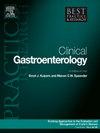Genetic landscape for screening and early diagnosis of pancreatic ductal adenocarcinoma: is there a signature?
IF 3.2
3区 医学
Q2 GASTROENTEROLOGY & HEPATOLOGY
Best Practice & Research Clinical Gastroenterology
Pub Date : 2025-02-01
DOI:10.1016/j.bpg.2025.101988
引用次数: 0
Abstract
The last 15 years have seen unprecedent advancement in genomics techniques such as dense single nucleotide variants (SNVs) arrays or next generation Sequencing. In parallel, new analytical methodologies have been developed to streamline data understanding and integration. These advances have been instrumental in identifying common genetic variants associated with pancreatic ductal adenocarcinoma (PDAC) risk. The role of the individual variants is rather small, and they have no clinical utility for screening or early detection. However, their combined effect computed though polygenic risk scores (PGS) are showing promising potentiality in PDAC risk prediction. There still caveats, and limitations that need to be properly addressed however it is foreseeable that the genetic background will become a powerful tool in PDAC prediction, leveraging the advantage that it has compared to other biomarkers: germline genetics is invariable from birth to death.
胰腺导管腺癌筛查和早期诊断的遗传景观:有一个标志吗?
在过去的15年中,基因组学技术取得了前所未有的进步,如密集单核苷酸变异(SNVs)阵列或下一代测序。同时,还开发了新的分析方法,以简化数据理解和整合。这些进展有助于识别与胰腺导管腺癌(PDAC)风险相关的常见遗传变异。个体变异的作用相当小,它们对筛查或早期发现没有临床效用。然而,通过多基因风险评分(PGS)计算其综合效应在PDAC风险预测中显示出良好的潜力。尽管仍有需要适当解决的警告和限制,但可以预见的是,遗传背景将成为PDAC预测的有力工具,利用其与其他生物标志物相比的优势:生殖系遗传学从出生到死亡是不变的。
本文章由计算机程序翻译,如有差异,请以英文原文为准。
求助全文
约1分钟内获得全文
求助全文
来源期刊
CiteScore
5.50
自引率
0.00%
发文量
23
审稿时长
69 days
期刊介绍:
Each topic-based issue of Best Practice & Research Clinical Gastroenterology will provide a comprehensive review of current clinical practice and thinking within the specialty of gastroenterology.

 求助内容:
求助内容: 应助结果提醒方式:
应助结果提醒方式:


